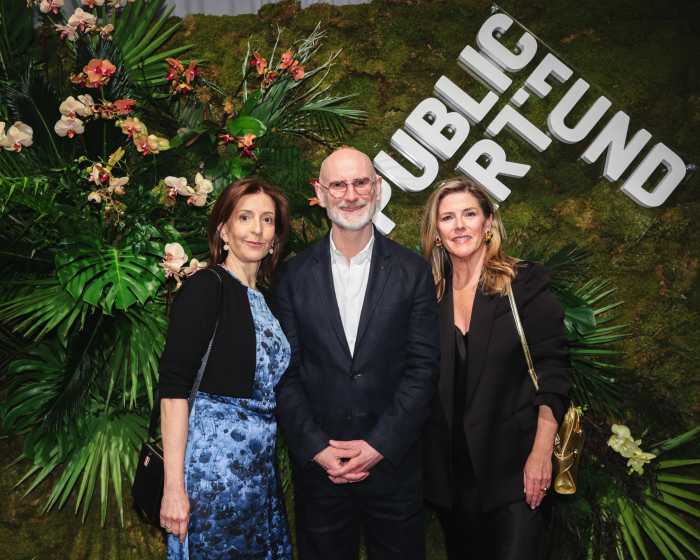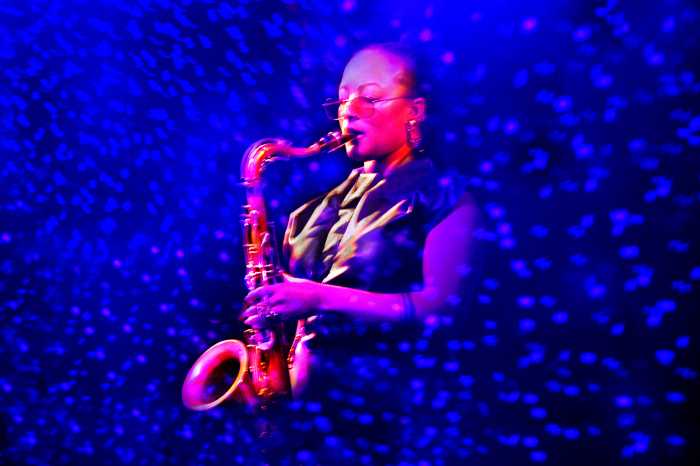By Lincoln Anderson
Yetta Kurland is sticking to her gun.
She says it’s a “requirement” and a “responsibility” for her to be allowed to have a deadly weapon.
In February, The New York Times reported, in an article headlined “The Rich, the Famous, the Armed,” that the Downtown activist was one of the more than 37,000 people licensed to have a handgun in New York City.
Other high-profile Big Apple residents who are permitted to own guns, according to the Times, include real estate mogul Donald Trump, shock jocks Howard Stern and Don Imus, Tribeca actors Harvey Keitel and Robert De Niro, Gristedes magnate John Catsimatidis, Queens District Attorney Richard Brown, federal judge Sterling Johnson Jr., divorce lawyer Raoul Felder,
Martha Stewart’s daughter Alexis Stewart and at least two city councilmembers, Inez Dickens and Peter Koo.
Kurland herself ran for City Council in the Third District in 2009, finishing second to Christine Quinn. She is widely expected to run for the seat again in 2013, after which Quinn will have to step down due to term limits.
According to the Times article, Kurland was “irked” to learn she would be included in an article based on firearm records provided by the Police Department to the Times.
Following the piece’s publication, Kurland — the leader of the Coalition for a New Village Hospital — sent out an e-mail to friends and colleagues, sharing a letter to the editor that she wrote in response to the article. (Apparently, her letter did not actually run in the Times.)
“I worry your recent article ‘The Rich, the Famous, the Armed’ portrays firearms as tantalizing accoutrements of New York’s power elite,” Kurland wrote to the Times. “By placing those whose job responsibilities might call for firearm licensing (myself, other officers of the court and law enforcement like the Queens D.A.) alongside glamorous celebrities, you risk portraying guns as inviting, even fashionable. …Instead of glamorizing or trivializing guns, I wish your paper would bring attention to important efforts to control gun sales around the country, including the efforts of our mayor.”
According to Black’s Law Dictionary, the definition of an “officer of the court” is “a person who is charged with upholding the law and administering the judicial system. Typically ‘officer of the court’ refers to a judge, clerk, bailiff, sheriff or the like, but the term also applies to a lawyer, who is obliged to obey court rules and who owes a duty of candor to the court.” Kurland is a civil rights attorney.
In early January, after Congressmember Gabrielle Giffords was shot by a maniac in Arizona, Kurland led gun-control advocates in a candlelight vigil in Union Square calling for restrictions on high-capacity ammo clips, among other things. However, Kurland never let on during the vigil that she herself owned a gun.
In an interview with this newspaper last month, Kurland justified having a gun license, partly based on being an “officer of the court,” as she had said in her letter to the Times, but primarily because the language school she founded requires it. She is, or was at least until fairly recently, the executive director of Hello World Language Center, at 23rd St. and Park Ave. South. It was not immediately clear if she was still the school’s executive director. Her LinkedIn profile states that she is but her Facebook page doesn’t mention it.
“It’s a job requirement for me,” Kurland stated. “I’m a designated official for my language school. We’re licensed with the Department of Homeland Security. I’m required to have a firearm. … Our school has an emergency-preparedness plan — and we determined that the designated official has a gun. It’s a responsibility that comes with my job — I take it very seriously.
“It was a policy that was determined by our school after 9/11,” she explained. “It’s for a public-safety purpose. We submitted an application to the New York Police Department as to whether it serves a public-safety purpose.”
Asked why an ordinary language school needs deadly firepower, Kurland didn’t describe any specific situations that might arise to justify it.
“The school is licensed to issue I-20’s through the Department of Homeland Security,” was all she would say — though, not elaborating on what threat that might pose. An I-20 is a D.H.S. document issued by universities, colleges and schools providing supporting information for a basic student visa.
Kurland noted the N.Y.P.D. vets gun-license applications thoroughly.
“New York City has a very stringent process in terms of determining who is allowed to have a firearm,” she said.
Referring to the Times article’s headline, which she disliked, Kurland quipped, “I don’t consider myself rich and famous, thank you.”
Kurland wouldn’t say what kind of gun she has or where she keeps it — at her Chelsea home, her language school, her law office or somewhere else.
Asked if she totes the firearm of unknown model around with her on her hip or in a shoulder holster, Kurland said, “I don’t carry the gun on my person.”
Ron Kuby is one of New York City’s most well-known civil rights attorneys. Asked if he owned a gun, he said, no, but that there was a story behind it. He said he grew up in the Midwest — Kansas, to be exact — and so it was natural for him to have guns as a young man.
“I always had firearms,” he said. “When I went to Cornell Law School, I brought along my guns.” He had a pistol permit in Ithaca. Later, when he moved to New York City, he eventually learned he needed an additional special gun permit, and got one.
But ultimately, he said, “I began to realize I’m a lot safer without having a pistol in my pocket. I get in too many arguments. When you’re armed you don’t have to walk away. There are a lot of times in New York when I’ve walked away. Just shut up and walk away. The mouth is more powerful than the pistol.”
As a result, he surrendered his guns, some years ago, at Greenwich Village’s Sixth Precinct.
Noting he’s been trained in gun use, Kuby said he’s a “big believer in gun ownership,” and said, half-jokingly, that right-wingers shouldn’t be the only ones who are armed to the teeth, that the left needs some firepower, too.
But he said, “I’m just not comfortable with a lot of people having guns.”
Asked if he thought Kurland — as a civil rights attorney and language school director — really required a gun, he was skeptical.
“I don’t know why Yetta needs a gun,” he said. “I like Yetta. She just strikes me as a bit of a nut — that’s not a critical observation. … I fully support her right to have a gun. The fact that she has a gun doesn’t seem like the smartest thing to do.”
Regarding her claim that she needs a firearm as an officer of the court, Kuby said, “That’s just crazy. You’re an officer of the court for specific legal purposes in terms of how you act before the court — you have to address the judge in a particular fashion, dress in a particular fashion. We’re not required to be armed — I don’t get to have a tank.”
As for Kurland’s other claim, that her school requires her to have a gun for public-safety and emergency-preparedness reasons, Kuby was equally perplexed.
“I don’t know why an English-as-a-Second-Language school needs someone running around with a gun,” he said. “And it also sounds crazy, crazy — and not good crazy. You can check with [Police Commissioner] Ray Kelly on this, but I don’t see Yetta Kurland as my first line of defense against terrorists wanting to learn English. What good does it do you when one of your students goes berserk and decides to nuke you? It doesn’t add up.
“Look, guns are fun,” Kuby said. “I spent many, many happy Sundays with a pickup truck, guns and empty bottles.” He recalled the joys of shooting his “.45 long Colt,” a gun with extra-long bullets, at various objects and blasting gaping holes through them. He admitted he’s a “gun nut.”
Noting that Kurland is a lesbian who has taken on high-profile L.G.B.T. cases, Kuby said there is a lot of bigotry out there, and that that might conceivably be a more understandable reason for having a firearm.
On Wednesday, when this newspaper called the Hello World Language Center and asked to speak to Kurland, a receptionist who answered the phone said that Kurland “no longer owns the language school,” and suggested calling Kurland’s law firm. Asked when Kurland had sold the school, the receptionist said, “It happened a little while ago.”
During her interview with this newspaper last month, Kurland didn’t mention that she had recently sold the school or was planning on selling it.
This newspaper then left questions for Kurland with an employee at her law firm, asking for her reactions to Kuby’s comments about her and gun licensing and whether she had, indeed, sold the school. An e-mail was also sent to Kurland asking to talk to her.
Kurland responded a bit later by e-mail, saying, in part: “I am the founder of Hello World Language Center and serve as a Designated School Official for the school. … While I respect Mr. Kubi [sic] as a civil rights attorney, it is the NYPD who should be making a determination of what constitutes a legitimate purpose for gun licensure.”
In another e-mail, Kurland responded: “I don’t know what Ron’s definition of officer of the court is but many attorneys have [gun] licenses[.] I’m not sure how I am so unusual, in fact its [sic] my understanding that Ron is licensed for a firearm isn’t he?”
Kurland did not reply by press time to questions asking if she had recently sold the school or was still its executive director.
Postscript: On Thursday, Kurland e-mailed and phoned this newspaper to say she was still the executive director of Hello World Language Center. When the reporter asked her if she still owned the school, she said she would have to answer later.



































